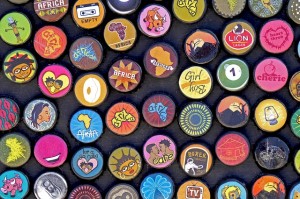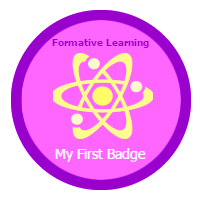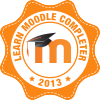Awarding Open Badges for reward, recognition and achievement
Traditionally paper certificates, badges (fabric, metal or plastic) and other physical objects (trophies or medals) have been used to show evidence for reward, recognition and achievement. Examples of these types of award come in the form of
Paper certificates
- passing exams at school, college or university
- attending training courses or workshops
- achieving a particular skill level at a sport or hobby
Badges/other physical objects
- recognition for being part of a club or society
- rewards for acts of skill or endeavour in youth organisations such as the Scouts, Girl Guides and Boys Brigade
- receiving trophies or medals for winning competitions
 These types of traditional awards have been around for a long time, but in the digital age don’t you think we could be getting more out of them such as being able share and disseminate our achievements more easily?
These types of traditional awards have been around for a long time, but in the digital age don’t you think we could be getting more out of them such as being able share and disseminate our achievements more easily?
How many of us have certificates that are lying in the bottom of a cupboard drawer somewhere; a medal gathering dust on an office shelf; or have membership of a high profile organisation, but don’t have anything to show to your colleagues, clients or customers?
It isn’t very practical gathering up your certificates, trophies, medals or non-existent membership objects, placing them in a rucksack, carrying them around with you and bringing out particular items to show to people at various events. This is where Open Badges can be useful and especially if you are someone looking at presenting awards to individuals for reward, recognition and achievement.
So what is an Open Badge?
An Open Badge is a shareable digital badge that contains meta data to describe why it was awarded. The meta data contains items for:
Issuer Details
- Name – the name of the organisation awarding the badge
- URL – the web address of the organisation
Badge Details
- Name – the name of the badge
- Description – a summary of why the badge was awarded
- Criteria – details all the criteria required for earning the badge
- Evidence – details any evidence that shows why a person has been awarded the badge
- Issued – the date when the badge was issued
- Expiry Date – a date (optional) when the badge will expire
Here is an example of an Open Badge that was issued to me for completing an online course, “Teaching with Moodle”.
If you click on the image, you should be able to see all the meta data for this badge – there are web links for some of the meta data that you can click to view in more detail.
As you can see from this example, I have also shown you that Open Badges are shareable and unlike a paper certificate that can’t be easily authenticated, contains evidence that it was actually awarded from a verified organisation!
Another benefit of Open Badges is that they can be organised into collections, allowing users to share relevant badges with certain individuals. Here is an example of one of my collections, which is stored in a Backpack (Open Badges and Backpack were the brainchild of Mozilla Foundation).
 I’m currently working with a training organisation to deploy a suite of Open Badges to incentivise their students in completing their online courses. For an online course that takes place over 6 months, students are awarded an Open Badge for completing monthly online activities and assessments. At the end of the online course, students are awarded a completion Open Badges i.e. they only receive this badge if they have been awarded all the individual badges for each of the 6 months. Organisations, education providers and communities such as NASA, University of Texas and the Open University are also using Open Badges to reward and recognise a variety of skills and achievements.
I’m currently working with a training organisation to deploy a suite of Open Badges to incentivise their students in completing their online courses. For an online course that takes place over 6 months, students are awarded an Open Badge for completing monthly online activities and assessments. At the end of the online course, students are awarded a completion Open Badges i.e. they only receive this badge if they have been awarded all the individual badges for each of the 6 months. Organisations, education providers and communities such as NASA, University of Texas and the Open University are also using Open Badges to reward and recognise a variety of skills and achievements.
So in summary
Open Badges make it easy to:
- Give recognition for the things you teach
- Get recognition for the things you learn and show
- Verify skills
- Verify being part of an organisation or membership
- Display your verified badges across the internet- on your web site, blog or even via your LinkedIn profile
So if you are looking to award Open Badges to your clients or customers and would like to setup an online badge awarding system or would want to be awarded your first Open Badge , please get in touch.
Author: Raymond J Moir, Formative Learning
12 Feb 2016
Free images from:
http://www.freeimages.com/photo/graduation-diploma-1240310
https://pixabay.com/en/botswana-africa-bottle-caps-badges-970274/

